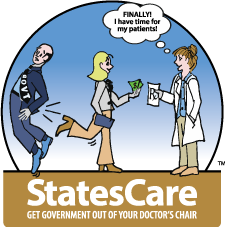
Why Did I Get the Wrong Rx?
By Deane Waldman, MD MBA - 08/07/20
The reason you got a prescription for the wrong medication is simple. Your doctor did not choose it, someone who never heard your name and doesn't know your medical history, that faceless person decided what medicines you take.
These faceless, unseen doctors-without-licenses are government rule writers, insurance actuaries, and bureaucrats working for pharmacy benefits management (PBM).
For example, 2018 memo from Centers for Medicare and Medicaid Services (CMS) decreed that, starting in 2020, Medicare Part D health plans will implement "indication-based drug therapy." Medically, an indication is pain in a joint (arthritis) or pneumonia (infection in the lungs). Doctors do not treat indications; we treat patients, one at a time, each with his or her own name, unique medical history, specific allergies, and individual reactions to specific medications, whether good or bad.
Consider Mrs. Jane Doe who has with joint pain from arthritis. A Medicare health plan might approve Ibuprofen as the first-line drug for the indication: arthritic pain. This drug works in many people, has few side effects, and is cheap. Unfortunately, Ibuprofen doesn't work in Mrs. Jane Doe, and her doctor knows it. Nevertheless, Mrs. Doe will get Ibuprofen - the wrong drug for her - because that is what a federal bureaucrat decided, not her doctor.
Prescribing the wrong Rx for you occurs throughout healthcare - it is not limited to Medicare. Most health plans require doctors i to use the "fail first" approach, also known as step therapy. When starting treatment, the treating physician can only prescribe the most "cost-effective, medically sound" medication. "Cost-effective" means cheapest drug for the health plan. "Medically sound" means lowest risk of side effects, which often means the drug is the least likely to be effective. After the first drug fails to help the patient, the doctor is then allowed to take the next step with a second drug also chosen by the health plan. Eventually, when all the cheap alternatives fail, the doctor may be allowed to special order the right drug. The bottom line is, again, someone other than your physician, in this instance an insurance actuary, choses your medications.
Doctors no longer take a small white pad out of a lab coat pocket to hand-write a prescription. Instead, today they order medications electronically through computer programs known as pharmacy benefits managers. A pharmacy benefit management program will list what drugs are allowed. If the one you need is listed, great! If not, too bad. In this case, a computer program created by an unnecessary middleman - not your doctor - decided what medication you get.
Whether it is a faceless insurance actuary, an anonymous government bureaucrat, or a soulless prescription benefit manager (PBM) program, the prescriber is not your doctor, does not know you or your medical history, doesn't care and will not be held responsible for what happens to you. The primary concern of PBMs is to "to reduce the cost of drugs" for the insurance company, not for you, the consumer, patient, and ultimate payer.
So why did you get the wrong Rx? Because neither you nor your doctor is in charge. The federal bureaucracy and insurance companies are. And when you wonder why the cost of drugs is out of reach, look no further than 1717 Pennsylvania Avenue in Washington, home of the Food and Drug Administration (FDA). This massive federal agency protects monopolies such as Mylan's with its EpiPen, suppresses market forces, and adds $1 billion to $2.6 billion to the prices we must pay for our meds.
The solution is straightforward, albeit politically unacceptable to the Beltway. Stop Washington's insurance mandates and repeal FDA rules, and return control of insurance payments to the ratepayers, i.e., you.
It's time to return decision-making authority where it rightfully belongs: with you and your doctor.
Why Read This Article:
It's time to return decision-making authority where it rightfully belongs: with you and your doctor.
By Deane Waldman, MD, MBA, author of "Curing the Cancer in U.S. Healthcare"
Professor Emeritus of Pediatric, Pathology, and Decision Science; former Director of Center for Healthcare Policy at Texas Public Policy Foundation; and author of award-winning, "Curing the Cancer in U.S. Healthcare: StatesCare and Market-Based Medicine."
Mailing address:
ADM Consulting & Books
PO Box 37396
Albuquerque, New Mexico 87176-7396
Copyright © 2015-2019 ADM Consulting & Books. All Rights Reserved. All other trademarks on this site are the property of their respective owners. Site design and maintenance by www.DesignStrategies.com.



